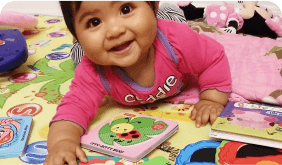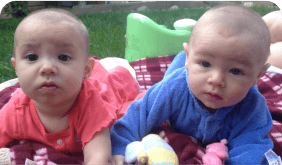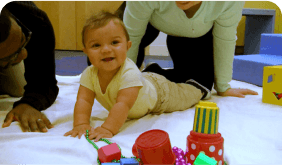Baby needs a lot of sleep! Regulating their sleep and knowing when baby’s tired is something parents try to master in the early months. It’s not always easy, but looking for sleep cues can help with this!
What does it mean for baby to be sleepy vs. overtired?
When baby is sleepy, their energy level is dropping and they’re ready for a nap or to go to bed. They’ll usually be quiet, but losing interest in what’s going on. It’s similar to how you might feel in the evening when you first think “I should get ready for bed.”
When baby is overtired, they’re really tired. They will be telling you that they need to sleep, and will often make noise or seem fussy. This is similar to how you might feel if you’ve stayed up way past your bedtime!

What are some sleep cues to look for?
Baby may be telling you they are feeling sleepy if they:
Lose interest in what you’re doing
Seem drowsy
Have a “glazed over” expression or staring
Yawning
Red or flushed eyebrows
Droopy eyes
Less responsiveness or looking away
Pulling at ears
Closing fists
Frowning
Sucking on fingers
What are some overtired cues to look for?
Baby may be telling you they are overtired if they:
Cry
Seem rigid or are pushing against you
Don’t want to be held
Get fussy or irritable
Rub their eyes frequently
What should you do when you notice a sleep cue?
Sleep cues are baby’s way of saying they need to get some rest. If possible, try following baby’s sleep cues to help establish a sleep schedule.
What are toddler sleep cues?
As baby gets older and is able to be more independent, their sleep cues may look a little different! Signs they are tired may be:
Clumsiness
Crying
Clinginess or wanting attention
Boredom or not wanting to play
Upset or fussiness
If your toddler is showing sleep cues, it’s best to react calmly. Take them to the place where they usually sleep and help them feel comfortable and ready for sleep; reduce light in the room, close blinds and put toys away.
Do children ever stop showing sleepy cues?
Think about it: as an adult, you still yawn, rub your eyes, lose interest in things when you’re tired, and maybe get a little bit irritable (just a little bit!). So we are always showing sleepy cues throughout life! But as children get older, they’ll be able to stay awake for longer periods of time and can be more independent in managing their sleep schedule.





